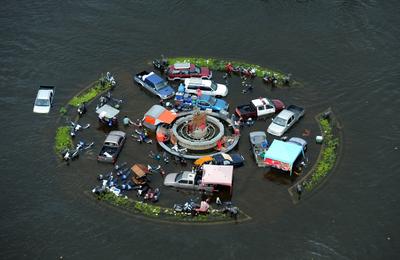The FROC delivered conflicting reports and unclear flood maps, which in turn, caused confusion rather than assurance among the public. The Center has also come under fire for the noticeable lack of academics and cartographers being drawn upon to provide expert advice. And now, municipal and provincial relief centres have popped up at the behest of different ministries and officials, further confusing the chain of command and undermining the consistency of relief efforts.
Political divisions were also quick to re-emerge as flood waters entered the Bangkok Metropolitan Area, a key constituency of the opposition, the Democrat Party. Bangkok Governor Sukhumbhand has been at loggerheads with Prime Minister Yingluck and Pracha since the national disaster’s onset. On the night of 23 October, Sukhumbhand issued an urgent warning to the capital’s residents, urging them to evacuate as rising water levels were imminent. This contradicted the government’s official position, which reassured the public of their safety. In a further attempt to discredit the prime minister, the prominent Democrat Party member remarked: ‘Listen to me and only me. I will tell you when it is safe’.
The failure to protect major industrial zones and agricultural land in other provinces, while scrambling to keep the capital dry, is a symbolic representation of how national policies cater to the urban elite. Bangkok accounts for 43 per cent of the nation’s GDP, presenting a compelling case for its survival. But the Democrats also want to outshine the Pheu Thai party, fearing the latter will contest Bangkok Metropolitan Area’s gubernatorial seat in the 2013 election — especially after the ban on the Thai Rak Thai Party’s former executives is lifted.
The media have circulated photographs of Abhisit Vejjajiva (current leader of the Democrat Party), Prime Minister Yingluck and General Prayuth Chan-ocha (Commander of the Royal Thai Army) working together, but local commentators have dismissed this as opportunism. Behind these images, blatant politicking continues to prevent genuine collaboration. Abhisit is keen on declaring a state of emergency, but the prime minister is reluctant to give the military control, despite the obvious advantages of having troop mobility and army discipline during a crisis of this magnitude. This is due to the tension between her administration and the army, coupled with fears of another power seizure. Instead, the prime minster has invoked a natural disaster law that puts her at the top of the chain of command, overruling the jurisdiction of the Bangkok governor.
Public discontent is not directed at political parties, but represents a general disdain for politics and bitter partisanship. There is even solidarity among the urban and rural population, the old battlegrounds of the 2011 elections. As the murky flood water recedes, volunteers deliver food and clean water to the displaced victims, while donations continue to be wired in for the relief effort. In a similar vein, the state’s response to a national crisis should be apolitical, but the ongoing rivalries and the inability of politicians to come together testifies to the deeply rooted nature of Thailand’s political divisions.
Chayut ‘Peko’ Setboonsarng is a recent graduate of George Washington University’s Master of Arts in International Affairs.

